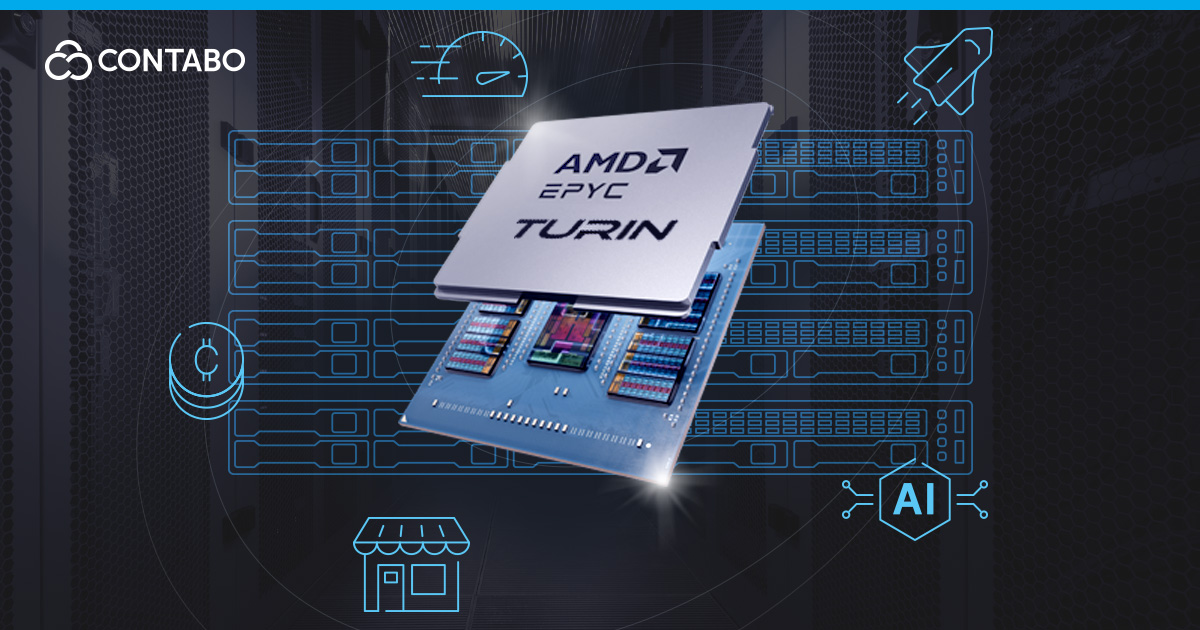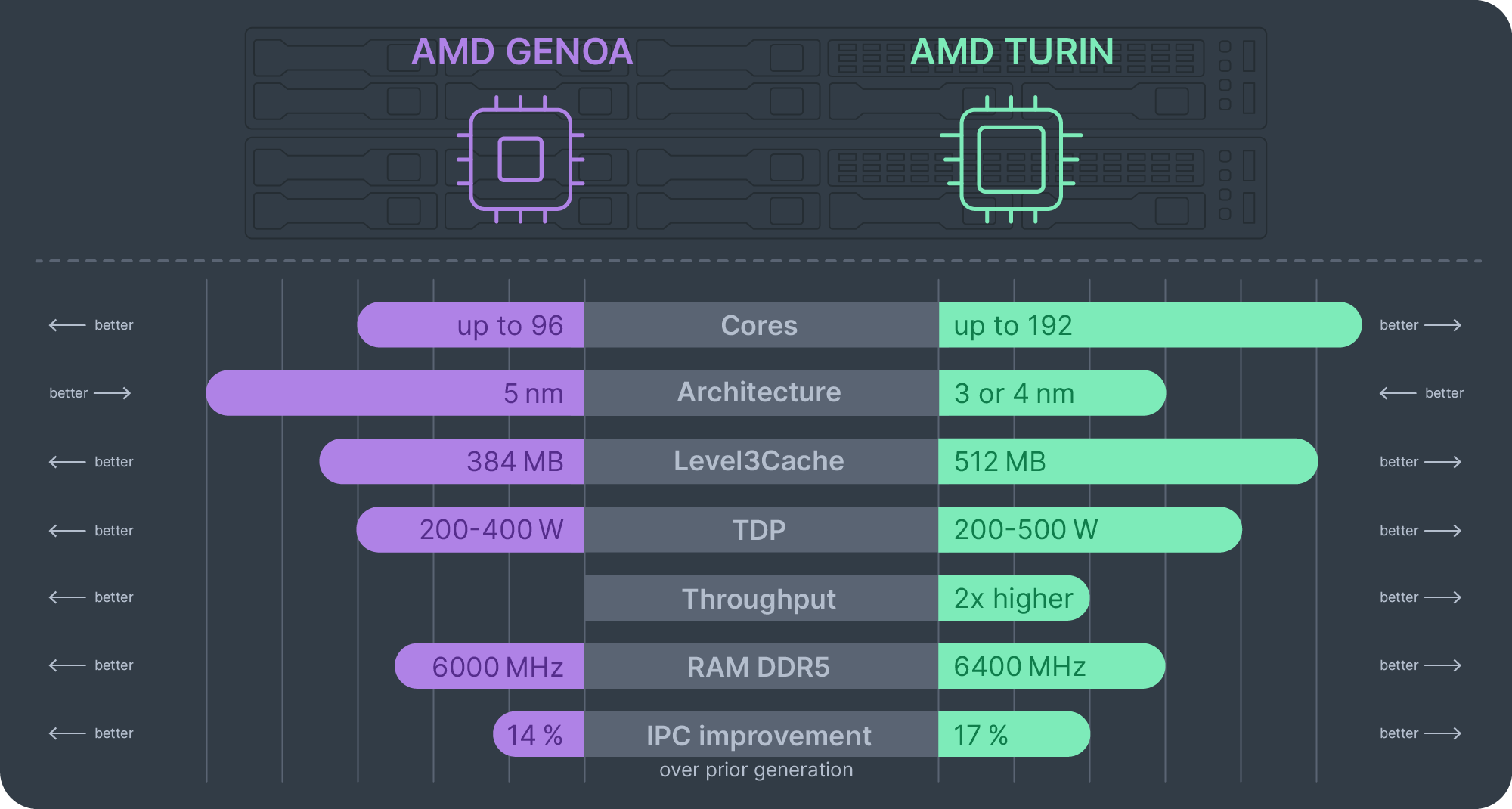
We’re excited to announce the addition of two new Dedicated Servers to our lineup, powered by the latest AMD EPYC Turin processors. These 5th generation EPYC CPUs represent a significant leap forward in server technology. They offer unprecedented core counts, enhanced performance, and superior energy efficiency – all at exceptional Contabo value.
You might remember that we added AMD Turin technology into our virtualization hosts earlier this year. The results were impressive: three times more VPS instances using just twice the power. Now, we’re making this same cutting-edge technology directly available to you as a Dedicated Server.
Available since the AMD Turin release date in October 2024, these new processors feature AMD’s advanced Zen 5 architecture. The new chips deliver improvements across all performance metrics that matter most for real-world workloads. Whether you’re running demanding databases, scaling ecommerce platforms, or deploying AI inference workloads, our new Turin-powered Dedicated Servers provide the foundation you need.
Let’s find out what makes these processors special and how they can transform your projects.
Understanding AMD EPYC: The Technology Behind the Power
When we talk about server processors, not all CPUs are created equal. AMD EPYC architecture represents a fundamentally different approach to server computing – one built around efficiency, scalability, and modern workloads.
For those less familiar with the EPYC lineup, what is AMD EPYC? It’s AMD’s flagship server processor family, designed specifically for data center and enterprise computing needs. The EPYC series offers exceptional multi-core performance with advanced security features built directly into the hardware.
At its core, the AMD EPYC processor family uses a chiplet-based design that allows for exceptional flexibility and performance scaling. Rather than creating a single monolithic die, AMD connects multiple smaller chips together. This approach delivers advantages in manufacturing yield, thermal management, and performance distribution.
The latest AMD Turin architecture takes this approach even further. Built on cutting-edge 3nm and 4nm manufacturing processes (depending on the specific model), Turin processors feature AMD’s new Zen 5 cores. These cores offer a significant 17% increase in instructions per clock (IPC) over the previous generation. This means more work done in each CPU cycle – a direct benefit for virtually every server workload.
What truly sets the AMD server CPU apart is its balance of raw performance, energy efficiency, and value. With support for 12-channel DDR5-6400 memory, and 128 PCIe 5.0 lanes, these processors provide optimized resources for today’s most demanding workloads.
Meet Your New AMD Turin Servers: DS 40 & DS 50
Our new Dedicated Server lineup features two powerful options powered by AMD EPYC server technology. Each is carefully configured to address specific workload demands while delivering the exceptional value you’ve come to expect from Contabo.
If you’re looking to buy AMD EPYC Dedicated Server solutions, understanding the differences between these models will help you select your perfect match. Let’s break down what each offers:
DS 40 (AMD TURIN 32)
- Processor: AMD EPYC 9355P (Turin) – 32 cores / 64 threads
- Memory: 128 GB DDR5 (upgradable)
- Storage: 2x 1 TB NVMe SSD (upgradable)
- Network: 1 Gbit/s unlimited traffic
DS 50 (AMD TURIN 64)
- Processor: AMD EPYC 9555P (Turin) – 64 cores / 128 threads
- Memory: 192 GB DDR5 (upgradable)
- Storage: 2x 1 TB NVMe SSD (upgradable)
- Network: 1 Gbit/s unlimited traffic
Both servers feature Fast Provisioning with No Setup Fees, and significant long-term discounts (10% on yearly contracts, 7.5% on six-month, 5% on three-month). They are now available in Hub Europe, with US locations coming soon.
The technical specifications tell only part of the story. What really matters is how these servers perform in real-world scenarios and the specific benefits they bring to your projects. Let’s explore each model in more detail.
DS 40 Deep Dive: Performance Without Compromise
The DS 40 is powered by the AMD 9355P, a 32-core, 64-thread Turin processor that delivers exceptional performance across a wide range of applications. With a base clock of 3.55 GHz and boost frequencies up to 4.4 GHz, this processor strikes the perfect balance between single-thread performance and multi-core capability.
What makes the DS 40 particularly impressive is how it handles various workloads. For database hosting, the combination of high core count, substantial L3 cache, and fast DDR5 memory means queries complete faster and your databases can handle more concurrent connections. Whether you’re running MySQL, PostgreSQL, MongoDB, or other solutions, database hosting services see substantial performance improvements compared to previous generation processors.
Ecommerce hosting platforms particularly benefit from the DS 40’s architecture. Your online store needs to remain responsive even during peak traffic periods. The Turin processor’s ability to handle numerous simultaneous connections ensures your customers enjoy a smooth shopping experience. For the best Dedicated Server hosting for ecommerce, the DS 40 delivers the performance headroom needed for those critical high-traffic events like Black Friday or product launches.
One of the most exciting applications for these new processors is AI computing. The Turin architecture includes significant improvements to vector processing capabilities, making it well-suited for CPU-based inference. While GPUs remain important for training large models, CPU-based inference can be more cost-effective for many production deployments. The DS 40 provides an excellent platform for organizations looking to implement AI cloud computing solutions without the premium costs of GPU-based systems.
Beyond these specific use cases, the DS 40 excels at any compute-intensive application that benefits from multithreading. From content delivery networks to development environments, this server delivers the great performance and value you need.
DS 50 Deep Dive: Maximum Power for Demanding Workloads
When your workloads demand maximum computing power, the DS 50 answers with the AMD EPYC 9555P. This powerful CPU features 64 cores and 128 threads, delivering extraordinary parallel processing capability for the most demanding applications.
The AMD 9555P is designed for scenarios where core count and total computational throughput are of the highest importance. With a base frequency of 3.2 GHz and boost up to 4.4 GHz, combined with a generous 256MB of L3 cache, this processor excels at handling multiple complex workloads simultaneously.
For enterprise computing needs, the DS 50 provides a foundation that can support numerous virtualized environments. This allows you to consolidate multiple workloads onto a single physical server. A similar level of performance previously required multiple servers or much more expensive hardware. This makes the DS 50 an attractive option for enterprise cloud computing solutions that need to balance performance with cost-effectiveness.
The DS 50 particularly shines in scenarios that demand sustained, heavy CPU performance. Infrastructure-as-a-Service (IaaS) and Platform-as-a-Service (PaaS) backends benefit from the processor’s ability to handle numerous concurrent virtual machines or containers while maintaining consistent performance. For hosting providers or resellers looking to build core infrastructure, this server delivers the density and performance needed to serve multiple customers efficiently from a single physical machine.
High-density parallel computing workloads see substantial benefits from the DS 50’s architecture. Scientific simulations, financial modeling, data analytics, and other compute-intensive tasks complete faster. This enables you to process more data or run more complex models in less time. These high performance servers deliver capabilities previously available only on much more expensive high performance Dedicated Servers or specialized HPC clusters.
The DS 50 also offers the best edge infrastructure for AI inference tasks. Its substantial core count and memory bandwidth allow it to handle multiple inference workloads simultaneously. This makes it an excellent platform for serving AI models at scale.
Evolution of Processing Power: Turin vs. Previous Generations
To fully appreciate what Turin brings to the table, it’s helpful to understand how it compares to previous EPYC generations. The progression from AMD Genoa to Turin represents a significant leap forward in processing capabilities.
The previous generation, AMD EPYC Genoa, was already impressive with up to 96 cores using Zen 4 architecture. Turin builds on this foundation with the new Zen 5 cores, offering that 17% IPC improvement we mentioned earlier. This means better performance even at the same core count and frequency. According to official AMD benchmarks, Turin consistently outperforms Genoa CPUs, achieving approximately 2x higher throughput in most configurations, particularly when running AI and machine learning workloads.
But Turin doesn’t just improve performance – it also expands the maximum core count. While the Genoa series topped out at 96 cores per socket, Turin scales up to 192 cores with its density-optimized Zen 5c cores. This represents a 2x increase in maximum core density, delivering unprecedented computational capacity in a single socket.
Memory capabilities have also evolved. While both generations support 12 channels of DDR5, Turin increases the maximum supported memory speed to DDR5-6400 on qualified platforms, up from DDR5-6000 in Genoa. This might seem like an incremental improvement, but for memory-bandwidth-intensive applications, it can make a meaningful difference in overall performance.
What’s particularly impressive about the Turin architecture is how it achieves these improvements while maintaining reasonable power consumption. Despite the increased core count and performance, Turin processors feature similar TDP ratings to their Genoa predecessors, with most models falling between 200W and 400W.

Competitive Landscape: AMD vs. Intel in Server Computing
When evaluating server processors, it’s natural to compare different options. The AMD EPYC vs Intel Xeon comparison is particularly relevant for those making infrastructure decisions.
In today’s landscape, AMD EPYC vs Xeon benchmarks consistently show AMD’s advantage in core count, memory bandwidth, and PCIe connectivity. While Intel’s latest Xeon processors offer competitive single-thread performance, the multi-threaded performance gap has widened with Turin’s release.
The AMD server market share has grown significantly in recent years precisely because of these advantages. AMD’s official benchmarks show the EPYC 9755 Turin processor outperforms Intel’s dual Xeon Granite Rapids 6980P by about 40% on average across various workloads. AMD also reports that the EPYC 9965 CPU can deliver up to 3.7x the performance on end-to-end AI workloads compared to competitors, with 1.9x throughput improvements on certain generative AI models. These metrics highlight the strength of the Turin series across a range of essential tasks.
While raw performance is important, value also plays an important role in infrastructure decisions. The value proposition of our Turin-based Dedicated Servers is compelling: you get more cores, more memory bandwidth, and more PCIe lanes at a price point that makes high-performance computing accessible for a wide range of budgets and use cases.
Our Comprehensive Bare Metal Portfolio
These new Turin-based servers improve our existing Dedicated Server lineup, giving you better options to find exactly the right fit for your specific requirements.
Our cost-effective AMD Ryzen-based options remain available, providing excellent value for less demanding workloads or when budget is the primary consideration. These servers continue to offer solid performance for many common use cases like web hosting, development environments, or smaller business applications.
By introducing these new Turin-powered servers, we’re upgrading our lineup to address the most demanding enterprise workloads without compromising on our commitment to value. This approach ensures that whether you’re a small business, a growing startup, or a large enterprise, we have Bare Metal options that align with your needs and budget.
We’re repurposing our previous generation of Dedicated Servers with AMD Genoa CPUs as virtualization hosts for our VPS and VDS products. This creates additional value across our entire product lineup, as the performance improvements from these processors benefit our virtualized hosting customers as well. On that note, have you seen our new VPS lineup?
Experience AMD Turin Power Today
By bringing the latest AMD server technology to our platform at accessible price points, we’re enabling businesses of all sizes to access enterprise-grade computing power for their projects. Whether you need the balanced performance of the DS 40 or the massive parallel computing power of the DS 50, these new Dedicated Servers deliver exceptional value for your demanding workloads.
Ready to experience the power of AMD EPYC Turin? The future of high-performance computing is here, and it’s more accessible than ever. Explore our new Turin-powered Dedicated Servers today and discover what this cutting-edge technology can do for your projects.
